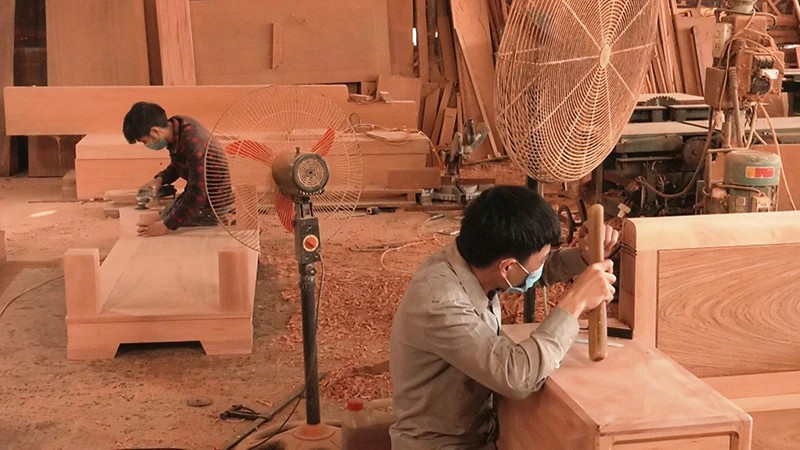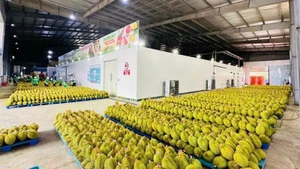However, like many other traditional craft villages, maintaining and sustainably developing the Thai Yen woodworking trade in the modern era remains a significant challenge, requiring continuous innovation and creativity.
The Thai Yen Woodworking Village began to form in the early 17th century, with the craft passed down through many generations. Thai Yen is known for producing wooden products such as tables, chairs, beds, cabinets, religious items, and intricate wood sculptures. These products are not only consumed domestically but are also exported to many countries, enhancing the value and prestige of the village’s craft.
Currently, the Thai Yen woodworking village has over 700 production establishments, providing jobs for thousands of workers both within and outside the commune. The annual revenue of local households from this trade is in the hundreds of billions of Vietnamese dong.
A distinctive feature of the Thai Yen woodworking trade lies in its completely manual craftsmanship, which requires meticulous attention to detail at each stage. The Thai Yen carpenters choose wood from valuable types such as lim, doi, go, sang vi, and vang tam, which are durable and of high quality. The product creation process starts with selecting wood that suits the specific requirements of each item. The wood is then cut, sawn, and processed into detailed components. Carving, assembling, and coating are done entirely by hand, ensuring that each product carries a unique, intricate design with great durability.
A completed Thai Yen wood product is not merely a piece of furniture but also an artwork showcasing the skill and creativity of the carpenter. Tables, chairs, cabinets, beds, and religious items all feature intricate carvings and patterns, often reflecting folk cultural motifs, creating a perfect blend of artistic value and practical function.
The quality of Thai Yen wood products is a key factor in their appeal to customers. The products are not only beautiful but also highly durable, thanks to the use of good quality wood and manual craftsmanship. Each product, whether household furniture or religious items, is crafted with care and precision, ensuring customer satisfaction.
Thai Yen wood products are widely consumed domestically and are also exported to other countries, which helps increase the value and reputation of the village’s craft. The export of products to international markets has contributed to the economic growth of Thanh Binh Thịnh Commune and Ha Tinh Province.
One important factor contributing to the development of the village’s craft is the quality and reputation of the wooden products. In 2019, Thai Yen Woodworking Village was granted a collective trademark certification, “Thai Yen Woodworking – Traditional Craft Village of Duc Tho, Ha Tinh”, which helped enhance the brand value and made the products increasingly popular among domestic and international consumers.
Despite these successes, Thai Yen Woodworking Village still faces significant challenges in maintaining and sustainably developing the traditional craft. Competition from industrial wood products, a lack of young labour, and difficulties in accessing new export markets are issues that need to be addressed.
To achieve sustainable development, Thai Yen has focused on modernising technology and improving product quality. Production establishments have applied scientific techniques in the crafting process to enhance product quality while preserving and promoting the traditional cultural values of the craft.
Additionally, the development of the “Thai Yen Woodworking” brand through marketing activities and product showcases at international fairs and exhibitions is a strategic direction to increase global recognition and expand sales.
Thai Yen is also focusing on training human resources, especially the younger generation, to continue inheriting and developing the traditional woodworking craft. Production establishments have begun collaborating with vocational schools and training agencies to teach skills to local youth, helping them not only preserve the traditional craft but also improve their craftsmanship to meet the demands of the modern market.
Thai Yen Woodworking Village is not only a shining example of the traditional woodworking industry of Ha Tinh but also a symbol of the combination of traditional culture and modern economic development. With its unique values, Thai Yen woodworking helps improve the living standards of the local people and contributes to the sustainable development of the local economy. However, for Thai Yen woodworking to continue thriving in the future, there needs to be strong investment in technology, labour training, and international market development to ensure the long-term sustainability of the craft and its cultural value.
















